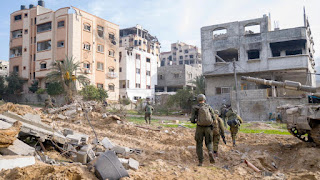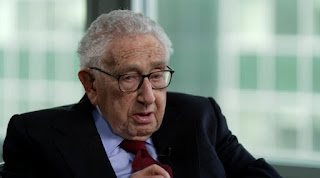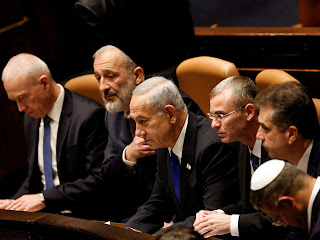A retrospective flashback to justify Israel - Hamas war
On Oct 7, 2023, a Hamas air strike
was launched in Gaza Strip, Thousands of rockets from Gaza hit the regions of
the middle and south Israel and militias of the Palestinian Islamic group, that
USA and EU targeted as “terroristic organization”, went through the Israeli
border from the Gaza Strip to take over the control of some southern
locations. Up to now, in this last
attack, Hamas militias killed at least 1,200 Israeli
people, almost
everyone civilians,
caused more than 3000 wounded, and taken
hostage 240 people.
Netanyahu declared that Israel will win this war triggered by
Hamas. Starting aerial operation named “Iron swords” above Gaza, in the
attempt of knocking down Hamas military targets.
The Gaza Strip is a coastal region
of 360km2 populated by 2 million people, whose about 1,400,000 with the status
of refugees. From 1967 to 2005, this region was militarily occupied by Israel.
In 2007, 2 years after the Israeli withdrawn , Hamas took control of the Strip
and since then, Israel has kept on operating a blockade that has lasted until nowadays... Today in
Gaza more than 80% of the population lives thanks to the humanitarian aids and the enterprises engaged in the production
of necessities are jeopardized as well as the overall economic growth. The
growing number of Israeli settlements, the presence of check-points and
roadblocks and the subdivision in regions for military and civil checks shows
up the fragmentation of the territory.
To further complicate the political background, there’s also Israel's
internal growing tension: on Dec 2022
was officially installed the nth government led by Netanyahu, after the right-wing coalition, won the
parliamentary elections. These parties are conservatives and ultra-orthodoxes,
contesting the ‘two States solution’, a formula that would settle down the
State of Palestine in the West Bank.
Among the first Netanyahu decisions, there were the legalization of new
Israeli settlements in West Bank and the approval of building new colonies,
internationally denounced as illegal and being this the main obstacle to reach
an enduring peace. The government approved a law to revoke the citizenship or
residency visa not only for those condemned for terrorism , but also for those
who receive a monetary support from the ANP.
Stepping back through the history of the Israeli- Palestinian
conflict,we could explore vital issues:
at the end of XIX century, when on the wave of
the European nationalism and in response to the sharpening of the
antisemitism, the journalist Herzl worked out the Zionism ideology, a political
movement that claimed the Hebrews right
of self-determination in Palestine, the key points of this ideology were
enlisted in the “Balfour Declaration”, that’s the content of a letter that in
1917 the British Foreign Minister Arthur Balfour jot down to
the Zionist lord Rothschild, prominent member of the British Jewish
community, in which His Majesty affirmed its support to the creation of a
“Jewish national hearth” in Palestine.
At the end of the war, the
winners decided to distribute the Arab provinces of the Ottoman Empire:
Palestine, Iraq and Jordan were entrusted to the Great Britain, whereas Syria
and Lebanon shifted to the control of France. The presence of London and Paris
in the region were institutionalized by the League of Nations, later UN, by the
creation of Mandates, a system by which the colonial powers committed
themselves to manage the territories and drove them in their path to the
independence, facilitating the immigration of European Jews. This decision was not welcomed by the
Arabs that carried out protest movements against the British and the Jewish
community. In 1947, the UNGA approved a resolution that envisaged the Palestine
partition in two States, one Jewish and one Arab, and entrusted Jerusalem to an
international jurisdiction. This decision was a bold pursuit for the Jewish but
not for the Arabs, that rejected the possibility they could get an independent
State in their territories.
At that point, the relations
between Jews and Arabs degenerated, leading, after the departure of the British
at the end of the Mandate, to an outright armed conflict. In 1948, following to
the Declaration of Independence of the State of Israel, the armies of
Egypt, Transjordan, Syria, Lebanon and Iraq gave the start to the first
Arab-Israeli war. At the end of the conflict in 1949 that loomed the defeat of
the Arab armies, the borders of the newborn State of Israel consisted in the
78% of the mandatory territory of Palestine.
During the conflict, about 700.000 Palestinians were forced to flee
their homes and this exodus, known as Al- Nakbah, the catastrophe, is at the
origins of the matter of the Palestinians refugees, one of the sticking points
of the conflict.
The clashes continued until out
flowing into the War of Six Days (1967), when the Israeli army succeeded
to vanquish Egypt, Jordan and Syria.
This victory allowed Israel to occupy Gaza Strip, West Bank and a part of
Jerusalem, until then controlled by Jordan.
This defeat pushed Palestinians to
a greater political activism. Between the ‘60s and the ‘80s, there was an
insurgence of Palestinian groups and parties that gave voice to their national
aspirations. In the ‘60s followed the
foundation of the OLP, a
structure that would give coverage to the parties and armed Palestinian
groups. In 1973, Israeli and Arabs newly
faced each other in the Yom Kippur war with the result of a restitution of
Sinai to Egypt and a further Israel expansion to the Golan Height,
Exasperated by the failed
recognition of their national aspirations, in 1987 the Palestinians of
Gaza and West Bank started a series of protests against Israeli occupation –
the first Intifada- that lasted until 1993– and in these disorders
was born the Movement of Islamic Resistance (Hamas), an Islamist
organization that took origin from Muslim Brotherhood and characterized
by its inflexibility against Israel.
Between 1993 and 1995 were signed the
Oslo Accords that, set off for a new and independent Palestine the division
of the territory in three areas (A, B and C) and the creation of an autonomous
administration, the National Palestinian. The insurgence of Netanyahu in
the Israeli government in 1996, went to block the negotiations on the matters
left open by these accords, giving a serious blow to the peace process.
The stalemate in negotiations
contributed to newly inflame the Palestinian territories between 2000 and
2005 with the outburst of the Second Intifada. In 2002, Israel
started the building of a wall of separation between its own territories and
those of palestinians in the West Bank.
In the meanwhile, in 2020 were
signed the Abraham Accords, that established a normalization of the
diplomatic relations between Israel and the UAE, Bahrain, Morocco and Sudan,
whose exchanges notably increased.
The Israeli colonies are authorized
and often financed by the Israeli government, although they are considered
illegal from the international law. Today these colonies are present in the
West Bank (including East Jerusalem), the Golan Heights, internationally
considered part of the Syrian territory. East Jerusalem and Golan Heights,
annexed by Israel.
Having a look at the crucial
crossroad of Jerusalem, it must be said that its importance is due to the
sacred places of all the three monotheistic religions. In Old Jerusalem are
based the Temple Mount and the Wailing Wall, sacred to the Hebrews, the Al-Aqsa
Mosque, sacred to Muslims, and the Church of Holy Sepulcher, the
place of burial of Jesus.
The 1947 UN plan of partition
envisaged that Jerusalem would have to undergo to the international protection.
The line of the 1949 armistice divided the town into a west part, controlled by
Israel, and an Est part, controlled by the West Bank. On the 1967 War of Six
Days, Israel succeeded to conquering Est Jerusalem and all the West Bank to
later annex this part of the town in 1980.
Since then, Israel has tried to
change the demographic composition of this part of the city, bringing forward a
politics of evacuation and demolition of the Palestine residential buildings
and of settlement of Israeli citizens in the area. Palestinians on the other
side tried to safeguard their presence in this portion of the city.
The matter of the Palestinian
refugees dated back to the Nakba,. Today the Palestinians
refugees are almost 6 millions and they are deployed in in the refugees
camps in West Bank, Lebanon, Syria, Gaza Strip and Est Jerusalem.
Nowadays, the only State that has
fully integrated them and recognized full right of citizenship has been the
West Bank. The matter of the refugees is one of the milestones of every
negotiation: the resolution 194 of the UNGA set off, in facts, their right of
refoulement in the territories of the
Mandate of Palestine.
Israel fears the return of
Palestinians as they would change the demography of the State, radically
increasing the Arab population and dropping the Hebrews one..
The two States solution envisages
the creation of two States, one Israeli and one Palestinian,. It’s a compromise
solution that for years has been internationally preferred to the birth of a binational State or conferring
the control of the territories to the West Bank.
It has been contested among
Palestinians and Israel's stance has caused
a stiffening of the Palestinian public opinion that at the end has
agreed to a compromise but the Israeli leadership hasn’t seemed any more available
to support it, bringing forward a project of progressive annexation of the
Palestinian territories..
USA have increasingly taken on a
mediation role. They eased all the normalization process between them. This
pro-Israeli stance has made Washington
less and less impartial in the Palestinian's opinion that they see as a sturdy
sponsor of Tel Aviv..
EU, instead, has played a minor
role in the peace talks. It is the main international partner of the ANP, which
invested some billion euros to answer back to the humanitarian crisis of Gaza
and to reinforce the democracy of Palestinian Territories .
Since October 7, 2023 when the
Hamas attacks against Israel have returned to inflame the Holy Land, we are
assisting in present days to a temporary ceasefire in which dozens of civilians
held hostage in Gaza have been released in exchange for the release of
Palestinian prisoners..Israel, backed by the US, is discussing, have agreed to
an extension of the truce.
An estimated 5500 children have
been killed in the Gaza Strip, hundreds more are reported missing and may
be trapped under the rubble. One child in Gaza has been killed on
average every ten minutes.
In the face of mounting violations
against children, international rights advocates recently called on UNSG
Guterres to immediately add Israeli forces, the al-Qassam Brigades (Hamas’
armed wing), and Islamic Jihad to his “list of shame,” Although his initial
resistance, in fact, now he has no choice.
Guterres said that “Gaza is becoming
a graveyard for children” having Israeli airstrikes hit 300
schools and killed 183 teachers in Gaza. The WHO has reported that at
least 553 people have been killed in 178 attacks on medical facilities in Gaza
between Oct 7 and Nov 21, and that the majority of hospitals in Gaza are
no longer functional.
Israel’s blockade of water,
food, medical supplies, electricity and fuel, has made also difficult the
humanitarian assistance.
Adding parties to the list will not
immediately protect children, but is an important mechanism that requires
parties to adopt concrete action plans to end their violations..
Finally,
Israel-Hamas war has already had deep political and economic implications for
all the countries of the MENA region. Saudi Arabia, and Qatar, i.e., are
striving for mediation to put an end to the war, having a realist approach to
geopolitical regional balances, and
economic interests and it must be wondered how could relations with its
neighbors evolve, what security risks will be in the Red Sea, although the
Kingdom promises of a potential growth and prosperity.
Internet Sources:
Ispionline.it
Reuters.com
CNN.com
Hrw.org




Comments
Post a Comment